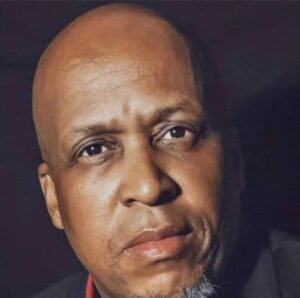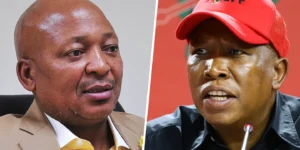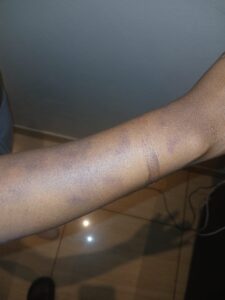By: Clyde N.S Ramalaine
They say old folk tends to behave like children; in the last two weeks, South Africa as a nation had a front seat in this theatrical and toxic tantrum of South Africa’s oldest serving parliamentarian and nonagenarian.
This soap opera of politics, draped in bitter entitlement, better understood in a tantrum, spares no one. It invokes the dead monarch against the living; it pits a monarchy against a convenient democracy, ‘decades of experience’ at the expense of the new. It deliberately conflates the personal with the communal, the captured with the authentic, and advanced constituencies of pseudo with the claimed custodian. It plays off in the name of a group identifying as Zulu.
Let me first debunk the notion of the Zulu ‘nation’ as often used by Buthelezi and others. There can never be a Zulu nation if we appreciate the theoretical incoherence of the construct and its usage. This notion of South Africa consisting of multi nations defining its populace derives from apartheid racist anthropology. Apartheid created the idea of many nations and insisted on separate development policies. It is merely regurgitated by those who agree with the analysis of a South Africa made up of those who seek benefit from its usage. Its usage in this era is directly from this apartheid myth that seldom is critically engaged. You will find the notion of many nations as also part of the ANC language. South Africa, as a constitutional democracy, is yet to afford its citizens agency and opportunity to engage this notion of nation, nationhood, and what it means. To pretend we all know what is meant when we use the construct is to engage in deception.
I have elsewhere contended, ‘it is important to note that the ANC does not articulate a concise and clearly conceptualised detailed theory on the definition of nation. In this regard, we note this conflation as an ambiguity of what nation means, serving as an advantage that affords divergent parties to speak in an uncritical sense of the nation; that, if allowed time and space to specify, may prove to be the opposite of the muddled meaning.’
M.K. Cope notes, “This proteanism allows flexibility in the rhetorical use of the term “nation”; nationhood can be conferred on one group or denied to another as deemed politically expedient, even if such usage is theoretically incoherent. A detailed conceptualization of the notion of nationhood by itself would encroach on the space of the ANC rhetoric and policy when it increases the plausibility of dissent among its constituent elements.”
Equally, the same could be argued for the Zulu people, often conflated to refer to a singular nation separate from others while it does not afford others such nationhood claims. In this regard, we warrant challenging all those who, in either ignorance or arrogance, advance the existence of a Zulu nation separate from and yet entitled to land that others cannot share in.
Let us hear Mangosuthu Buthelezi in his own words on establishing the Ingonyama Trust. In the Sunday Times of 4 June, page 8, we read: “When I created the Ingonyama Trust, I made the King the sole trustee. No more than that. He is not the owner of the land, but he holds the land on behalf of us, his subjects, for our welfare. Without questioning the authority of our monarch, it is necessary to say that our voice as the King’s subjects hold weight’ Mangosuthu Buthelezi.
This is a proverbial mouthful and telling on so many fronts. From this averment of Mangosuthu Buthelezi, we understand that the Ingonyama Trust, a government institution governed by PFMA policy regulations, which speaks to over 2 million hectares of land is the brainchild and product created by Buthelezi. We learn he made the King the sole trustee. We also know from this that the King does not own the land and that the land is owned on behalf of those Buthelezi explains as ‘us’ to describe the Zulus. Notice the invoked centrality of the person, the individual Buthelezi. Yet we must remember that Buthelezi, carrying many hats, he’ is not just a cultural leader but central to the Zulu monarchy and an old-hand politician.
In case you wonder what is at stake and why this issue is in the news. The problem known in public space is that a new Ingonyama Trust Board is due for an appointment. The provision of governance for the Board entitles the Zulu King Misuzulu KaZwelithini to appoint only the chairperson since the State sets the rest of the board members. We also know that in this regard, the State, as represented by Minister Thoko Didiza as it relates to the other board members, is on Board, and there is no tension between the State and the Zulu Kingdom, as represented by the current King in his choice as to whom it appoints.
We know that King Misuzulu KaZwelithini has exercised his right to appoint a chairperson, and the chair he appointed, as is his entitled right, is Mr. Thanduyise Mzimela. This choice on the part of the monarch is precisely the problem since Amazulu Prime Minister Buthelezi disagrees with the Zulu king Msizulu’s choice, Thanduyise Mzimela, as chair of the Board of the Ingonyama Trust.
Buthelezi is of the mind that the King appoints Mr. Jerome Ngwenya, who is the outgoing chairperson. Amazulu Prime Minister Mangosuthu Buthelezi went as far as to assert that if King Misuzulu KaZwelithini insists on appointing Mzimela, Ngwenya should stay on to teach Mzimela the job as he has extensive experience.
Buthelezi contends that the job of chairing the Board, …” demands intricate knowledge of the law, a keen understanding of indigenous and customary law, and a commitment to be in the office every day to manage these complex matters in a hands-on fashion.” Buthelezi then goes as low as playing Msizulu off against his late father, Zwelithini, for the latter’s choice to have Ngwenya. He asserts, “Over decades, his majesty [King Zwelithini] and Ngwenya developed intimate insight into matters relating to the Ingonyama Trust Land, how to protect it, and how to ensure that the original vision was maintained for the benefit of all our people.”
With this defense for a Ngwenya appointment, Buthelezi negates the fact that as King Zwelithini and Ngwenya, through time, painstakingly developed this intimate insight on the matters of Ingonyama Trust Land, Misuzulu KaZwelithini and his choice, Mzimela can equally do so. Mangosuthu’s logic does not extend to this basic appreciation that institutions outlive founders since they are subject to transition because individuals move on. However, if it is ever about the people, they remain the centre.
Resorting to innuendo and gossip, Buthelezi said, “There are rumours of bribes being offered and strategies developed to ensure that the rich inheritance of the Zulu nation can be taken from us to enrich a corrupt few individuals. If they succeed, our King [Misuzulu KaZwelithini] will have sold our land. He will be selling the very ground on which we have our homes to someone in another province who accuses us of being tribalistic when we want to protect our heritage.’ This statement unveils Buthelezi nakedly relying on an untested rumour to state the truth of his mind, although he is not willing to own the implications of what he asserts.
From this, according to Buthelezi, King Zwelethini was more obedient and welcoming of his advice and therefore uncritically listened to Buthelezi, something Misuzulu KaZwelithini seems not to be.
The first question Buthelezi must answer is, did he also advise the late Zwelithini to appoint Mr. Jerome Ngwenya at the time? The answer is self-explanatory. We have to surmise that it was Buthelezi who ensured Ngwenya was appointed. The issue here is the flagrant conflation of Zulu tradition, evolving practices, political office, statecraft, economic-and- self-interest, and narcissism. Buthelezi centralises everything around himself, as the axis for the existence of a Zulu Kingdom, at least in ownership of land definition.
As a true politician Buthelezi resorts to more questionable tactics, from cheap rumour-mongering, which he gives legs, to scare-mongering of ‘outsiders’ unsubstantiated claims of corruption and a king captured. These are modern-day commonly popularised nomenclature and themes in the South African lexicon. Extremely useful tools for polarising and demonising others with factionalism as once ultra-weapon. This while those who rely on them hope to exonerate themselves necessarily as the heroes of the people. It hits all the notes correctly, akin to our SA discourse. He employs all these to render himself innocent and the sole last defender of the Zulu people. He hopes to portray himself as the arch-protector of Zulu land and heritage; if this does not mean Buthelezi seeing himself as the actual Zulu king, nothing does.
Precisely what is at play here, if not naked disrespect, in which the AmaZulu Prime Minister Buthelezi attempts to invoke the notion of subjects’ voice in claims of democracy as carrying weight to direct the monarchy. If he insults the King, can he claim to be a subject? When he speculates that some could bribe the King to sell the Zulu land and heritage, is he not insulting the King?
It is a given that Mangosuthu Buthelezi has been serving for nearly 70 years as Amazulu Prime minister, meaning he served as the grandfather and father of the current Zulu king. Is Buthelezi not abusing this history to invoke a higher authority over the incumbent? He views himself as superior in knowledge and experience as an elder, and despite claims of great respect for the office of King, he, in a veiled sense of threat, claims himself the kingmaker. Is Buthelezi also not abusing AmaZulu for his own myopic or wider circling hitherto unknown interests?
I involuntarily thought of what Buthelezi’s behaviour reminds me of. His behavior is likened to those ‘uncles’ I observed during my tenure as pastor at cultural funerals that usually show up at a funeral primarily unknown to the family who never shared relations but in funeral week parades as the repository of cultural practices do’s and dont’s and instructs everyone from the claim of superior knowledge as to what the dead would have preferred and the culture demanded.
The advanced interregnum notion of Gramsci vibrates in the background with its intensity and velocity in which the old refuses to die while the new threatens to be born. Wielding his unfettered power and subliminal role Buthelezi never had problems until Misuzulu KaZwelithini. Well, could it mean Buthelezi got away with much more during the reigns of Msizulu KaZwelithini’s forebears, the same he will not share under the incumbent? Misuzulu KaZwelithini is obligated to transform the kingdom he inherited. It is not a matter of if but of when the Zulu people will remain relevant in the day of 4IR, bandied around as our new reality. Buthelezi, unfortunately, represents that which is history plausibly, not that which defines a future.
Reading this statement places Buthelezi at least on his reasoning and history as more significant than those he served or, shall I say, those he claimed he made kings. Buthelezi tries hard not to challenge the authority and power of Misuzulu KaZwelithini, yet we all can see he is at odds with and directing the monarch. Why would Buthelezi be this arrogant by what force can he extend himself as he does?
Perhaps the niggling question, what did Msizulu KaZwelithini uncover about the actual ownership of land as designed, crafted, orchestrated, and governed by Buthelezi? Is there a reason beyond mere pragmatic service that plausibly details why Buthelezi cannot retire? As part of his tantrum, he threatened to resign. Should the King not call Buthelezi’s bluff and accept his resignation?
As a non-monarchist and participant in a South African discourse, I have a number of niggling questions that I wish to advance as perhaps the pertinent questions Misizulu KaZwelithini ought to make part of his research in the protection of the monarchy: These without any ad-hominem negative or malicious intentions among others include :
Did Mangosuthu Buthelezi make any deals during the 1994 epoch? Are these deals including land and economic benefits that accrued to Buthelezi?
If the Zulu King prefers a particular candidate, why is the Zulu King not to exercise the choice of his prerogative?
Why is Buthelezi inserting a precondition of ‘experience’ as material for the appointment? The one Buthelezi advocated for as experienced was, like all, not born with experience and needed to know being appointed.
What does Buthelezi mean when he says the voice of the King’s subjects holds weight other than implying the issue can revolt against the King?
Is Buthelezi threatening the King with a revolt? Who is the ‘our’ that Buthelezi refers to, and how is our separation from him?
What are the tangible assets of Buthelezi? Is there such an inventory?
Was the land ownership at any time conflated with Buthelezi before the Ingonyama Trust, which he categorically asserts he established?
Finally, Buthelezi dares to claim he only seeks to protect the people’s interest and land in assets since, as he claims, outside people have captured the King. Why is it Buthelezi’s conviction that the King is captured when he does not see himself as having captured those he calls a Zulu nation? Why does Buthelezi convince that he represents the Zulu interest better than the King? Or should we ask, is Buthelezi’s behaviour depicting the actual power he has always claimed over predecessor kings?
Regardless of how Buthelezi may protest, he is engaging in cheap bullying tactics, abusing his seniority, authority, and Prime Minister status over the Zulu King. If he is as culturally astute as he claims, he would know he has disrespected the King with his statements and blackmail tactics. He seems to direct instead of being a subject.
The question Mangosuthu Buthelezi involuntarily forces on our thinking is why he insists on Ngwenya. Does he realise his insistence on Ngwenya places unnecessary pressure to want to know if Ngwenya is complicit in protecting certain information that Buthelezi, the politician, and businessman, perhaps do not wish South Africa to know in a history of deals?
Are we about to discover that Buthelezi employing his tactics of elder, supreme authority, and repository of Zulu people with his AmaZulu prime minister office, long supplanted the authority of the Zulu Kings? At the same time, he claims to be a subject of the King. Is this the fundamental reason the AmaZulu Prime Minister cannot resign his multi-offices spanning culture, IFP politician and Member of Parliament, self-proclaimed Zulu land and heritage protector? Are these indeed intermingled in a web of interest until now wrapped as consummated in one man who has ruled as ex -officio King of the Zulu people, without whom we are told a future is impossible?
As a parting shot, I, as a non-monarchist, want to know, if one as a member of the Zulu people can, on hearsay, accuse his King of being captured while claiming that you are a subject of the King, what does this mean? I want to know by what powers a subject can do this and still be in good standing with his monarch.
Anyone guilty of the words advanced by Buthelezi, as cited in the Sunday Times, against his King Misuzulu KaZwelithini would long have been on the red carpet, sanctioned, and duly fired. Maybe Buthelezi, after all, is the real Zulu king.
[*****The last time I wrote on the colourful Mangosuthu Buthelezi and his reinventing himself into a statesman, in the days of the New Age newspaper, he exercised his entitled right to reply – so I expect him to respond because this is not my last piece on Buthelezi.]

Political Analyst, Author Freelamce Writer
BTh. (Hons-Status) UWC, MA Systematic Theology cum laude NWU, Ph.D. [Politics & International Affairs] UJ,
SARChi & CADL [Centre for African Leadership Development] Post-Doctoral Research Fellow







